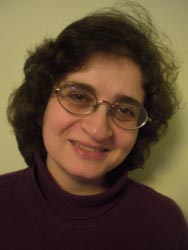 Nadia Krupnikova was born in Moscow, Russia and immigrated to Columbia, MO when she was 14 years old. As with many Soviet Jews, Nadia's family came to escape religious and political persecution of the Soviet Russia. They left Russia with ninety dollars and two suitcases per person, feeling lucky to have escaped as opportunities began to close. Along with her mother, Nadia worked odds jobs, including cleaning homes, looking after children and alterations to help support the family. At 18, she entered medical school in Kansas City, MO, with the intention of becoming a psychiatrist. Through the plethora of scholarships, grants and loans this dream was realized after she completed her residency at George Washington University in Washington, DC. Upon graduation she became director of inpatient psychiatry at GW, where she worked and taught until 1997. While there, she also co-authored a behavioral science review book.
Nadia Krupnikova was born in Moscow, Russia and immigrated to Columbia, MO when she was 14 years old. As with many Soviet Jews, Nadia's family came to escape religious and political persecution of the Soviet Russia. They left Russia with ninety dollars and two suitcases per person, feeling lucky to have escaped as opportunities began to close. Along with her mother, Nadia worked odds jobs, including cleaning homes, looking after children and alterations to help support the family. At 18, she entered medical school in Kansas City, MO, with the intention of becoming a psychiatrist. Through the plethora of scholarships, grants and loans this dream was realized after she completed her residency at George Washington University in Washington, DC. Upon graduation she became director of inpatient psychiatry at GW, where she worked and taught until 1997. While there, she also co-authored a behavioral science review book.
From then until 2000, she worked at the world-renowned Chestnut Lodge Hospital in Rockville, MD, that was founded on psychiatric principles that Nadia respected. Nadia wanted to work with severely ill patients who required hospitalization. Certainly, medications were used in treatment of the mentally ill, but Chestnut Lodge advocated a very humanistic approach that paralleled Nadia's view. It was a "labor-intensive" psycho-therapy which required intensive patient-therapist interaction. The world fame of Chestnut Lodge was well deserved, and Nadia thrived while practicing medicine there. With the closure of Chestnut Lodge, Nadia began a private practice in Rockville treating patients who are often severely mentally ill.Read more...


 Nadia Krupnikova was born in Moscow, Russia and immigrated to Columbia, MO when she was 14 years old. As with many Soviet Jews, Nadia's family came to escape religious and political persecution of the Soviet Russia. They left Russia with ninety dollars and two suitcases per person, feeling lucky to have escaped as opportunities began to close. Along with her mother, Nadia worked odds jobs, including cleaning homes, looking after children and alterations to help support the family. At 18, she entered medical school in Kansas City, MO, with the intention of becoming a psychiatrist. Through the plethora of scholarships, grants and loans this dream was realized after she completed her residency at George Washington University in Washington, DC. Upon graduation she became director of inpatient psychiatry at GW, where she worked and taught until 1997. While there, she also co-authored a behavioral science review book.
Nadia Krupnikova was born in Moscow, Russia and immigrated to Columbia, MO when she was 14 years old. As with many Soviet Jews, Nadia's family came to escape religious and political persecution of the Soviet Russia. They left Russia with ninety dollars and two suitcases per person, feeling lucky to have escaped as opportunities began to close. Along with her mother, Nadia worked odds jobs, including cleaning homes, looking after children and alterations to help support the family. At 18, she entered medical school in Kansas City, MO, with the intention of becoming a psychiatrist. Through the plethora of scholarships, grants and loans this dream was realized after she completed her residency at George Washington University in Washington, DC. Upon graduation she became director of inpatient psychiatry at GW, where she worked and taught until 1997. While there, she also co-authored a behavioral science review book.



